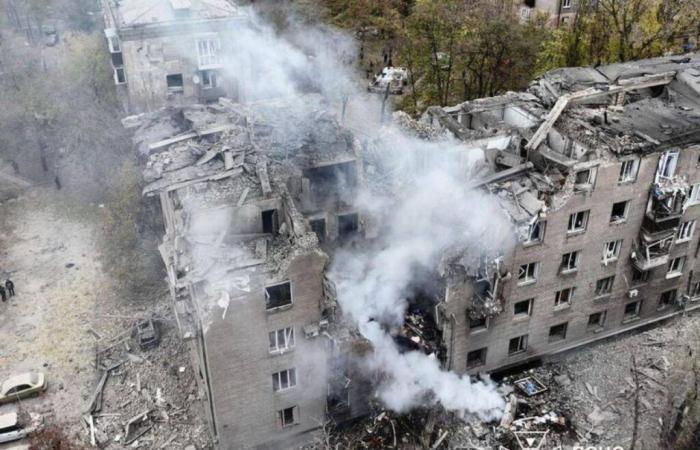It's an old adage of international relations: not having a seat at the negotiating table is being on the menu. There are plenty of historical examples, one of which has remained particularly, and rightly so, in the national memory is that of the Munich agreements in 1938 concluded between Nazi Germany, fascist Italy, France and the Kingdom – United recording the dismemberment of a Czechoslovakia which had not even been invited to the conference where its destiny was sealed. The parallel with Ukraine today is tempting, while Donald Trump claims to be able to put an end to “in 24 hours” to war by discussing with Vladimir Putin, which can only be done at the expense of Ukraine, 20% of whose territory is occupied.
Read alsoWhy Ukraine could rejoice in Donald Trump's victory
There is a real risk that kyiv will not be invited. Furthermore, it is not even certain that the Europeans are. On the other hand, it is very likely that Xi Jinping's China, but also Qatar and Turkey which, since the start of the crisis, have carried out several mediations, will be involved in the discussions.
If war and future peace are existential for the Ukrainians, they are just as existential for the Europeans who stake their credibility and the route of what will be the eastern border of the Union. In broad terms, Trump's plan, at least as far as we know, would impose a freeze of positions, buffer zones and Ukraine's non-membership in NATO. “Concessions unacceptable for Ukraine and suicidal for Europe”, Volodymyr Zelensky rightly warned. “Nothing should be decided on Ukraine without the Ukrainians, nor in Europe without the Europeans,” declared the French president, by receiving the Secretary General of NATO, the Dutchman Mark Rutte.
The essential rise in European power
The fate of Ukraine will therefore be the first real test of relations between the new American administration and the “Twenty-Seven”. After months of nibbling on the fronts at the cost of very heavy losses, with an average of 1,500 killed or seriously injured per day, Russia is preparing major offensives both in the Donbass and in the Kursk area, this small part of the Russian territory conquered by a Ukrainian incursion last August. The 70 days that separate us from Donald Trump's entry into the White House are therefore more than crucial.
Read alsoUkraine, economy, democracy… The challenges facing the EU after the election of Donald Trump
It is essential that the United States authorize deep strikes on Russian territory with Western missiles, which it prohibits, including those delivered by the French and the British, notably the Scalp and the Storm Shadow, because they have American components. “Peace through strength”, a notion dear to Americans and advocated by Volodymyr Zelensky, implies a rise in European power. This means very concretely that they are able to help kyiv militarily, including if the Trump administration reduces or even stops its support. “It will be difficult to provide Ukraine with all the weapons it needs and replace the United States, because we have neither their production capabilities nor the material reserves of the American army,” worries General Christophe Gomart, former director of military intelligence and Republican MEP. However, this is not impossible, despite the delays and the fragmentation of European defense industries.
Military aid to Ukraine: 0.2% of the GDP of the “Twenty-Seven”
“The Europeans now already provide 50% of military deliveries to Ukraine and our overall aid to Ukraine is even higher than that given by the United States, but some of the member states are slowing down their effort instead of strengthening it,” points out Camille Grand, from the European Council for Foreign Relations think tank and former deputy secretary general of NATO. Thus, until recently, Germany planned to halve the amount of its support for kyiv in order to respect its budgetary balances. The election of Trump and the very next early elections in February – with the announced victory of the CDU-CSU of Friedrich Merz, much more firm against Russia than the current SPD chancellor Olaf Scholz – could, however, change the situation.
Read alsoHow Olaf Scholz's lame coalition ended up imploding
“It is problematic to say the least to ask the United States to do more for Ukraine and not to be exemplary in this matter,” recognizes Camille Grand. European military assistance to Ukraine represents barely 0.2% of the GDP of the “Twenty-Seven”. We can do better and even much better. “ It costs less to defend Ukraine now and by giving it more resources than to have to provide ourselves in the future with defense budgets that could reach the level of those of the Cold War in the face of an ever more aggressive Russia. explains Muriel Domenach, former French ambassador to NATO. At the time of the Cold War, the defense budget of NATO members weighed between 6 and 8% of GDP. Today, it is supposed to reach at least 2%, but eight EU countries, including Spain and Italy, are still far behind and both Germany and France are just reaching this threshold. Only Poland with 4%, followed by the Baltic countries, on the front line, really invest in their defense.
“If Ukraine is important to them, Europeans must show their determination to defend it and give themselves the means to do so,” underlines Kenneth Weinstein, of the Hudson Foundation in Washington, a think tank close to the Republicans. The observation is obvious and certain European leaders, including Emmanuel Macron, are aware of it. “The era of geopolitical outsourcing is over,” tweeted Polish Prime Minister Donald Tusk after the announcement of Trump's victory. But we still need to really take action.
Already in 2017 Angela Merkel made the same observation during the first Trump presidency: “We Europeans must really take our destiny into our own hands. » The metaphor of a herbivorous Europe in a carnivorous world mentioned by the French president during the Budapest summit was launched for the first time 15 years ago by Sigmar Gabriel, then leader of the SPD. If there has been real progress under the shock of Covid and Russian aggression in Ukraine, not much has nevertheless been done to found a Europe as a power capable of ensuring its own defense.
A Europe still divided
“The Europeans must overcome a double denial: the first was that of the underestimation of the Russian threat and the second is the lack of preparation in the face of the redefinition of American priorities”, notes Muriel Domenach. The countries of the former Eastern Bloc had clearly seen the danger from Putin. France has clearly anticipated that Europe cannot rely exclusively on the American security guarantee. Paradoxically, the French vision triumphs even though Paris is profoundly politically weakened. But Europeans, faced with these issues and the consequences of Donald Trump's victory, still remain very divided. If Paris and Warsaw try to form a pro-Ukrainian front with the most motivated, some of the Europeans are less enthusiastic, starting with Germany where Olaf Scholz poses as “ chancellor of peace » noting a rise in pacifism in the country. In addition, a handful of capitals, first and foremost Budapest, are openly slowing down any commitment to real European defense.
Read alsoFrance finally strengthens its support in the reconstruction of Ukraine
In the immediate future, it is a question of not being confronted with the American-Russian fait accompli on Ukraine, while Donald Trump seems determined to move very quickly. “ We must quickly agree on a “engagement strategy”as we say in the Franco-English sabir, of the future American administration to demonstrate to the Americans that Europe can contribute to a settlement and that its voice must be taken into account”, wrote the former diplomat and advisor to the Montaigne Institute, Michel Duclos, in a column for the World. This implies for Europeans to have real proposals on the security guarantees to be provided to Ukraine, which will remain under Russian threat, until it can join NATO in the more distant future.
The alliance against China
In order to seduce Trump, the Ukrainians would have proposed that after the end of the conflict their soldiers could replace part of those deployed by Washington on the Old Continent, currently numbering 100,000. And above all who could be the best interlocutor to bring these ideas? Some think of the President of the Italian Council Giorgia Meloni who, for the moment, plays both sides but can boast of a real commitment to Ukraine while having very good personal relations with Donald Trump, and especially with Elon Musk.
We must agree to enter into the game of a transactional relationship with Washington, and weigh different subjects, including the relationship with China. This is the priority issue for the next Trump administration and is evidenced by the future appointment as national security advisor of Mike Waltz and Marco Rubio as secretary of state, who share a very hard line against Beijing. This is the moment of truth for Europeans. Ukraine's defeat would be theirs.






